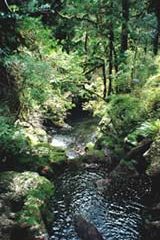Scientists examining the work that influenced Charles Darwin have rediscovered the details of what may be the world’s first ecological experiment.
Darwin, in his Origin of Species of 1859, referred to an experiment investigating the biology of grassland plants that showed how a greater diversity of grasses planted in experimental plots was responsible for greater production of plant matter. This subject, the relationship between biodiversity and the functioning of ecosystems, is curre
Common or garden straw could be a rich source of raw materials for a range of industries, from the health foods and cosmetics sectors to packaging and fabrics.
Researchers at the University of Wales, Bangor are developing environmentally friendly ways of processing wheat and other cereal straws to extract valuable products for industry.
The work is being carried out through the Government’s LINK scheme, with funding from the Swindon based Engineering and Physical Sciences Research Coun
Like silicon, silicon carbide is semiconductor and in some aspects, its characteristics are even better. Electrical strength of silicon carbide is ten times higher than that of silicon, heat conductivity is three times higher. Crystals of silicon carbide are almost perfect for power electronics. They can work at high current density (more than 10 kA per square centimeter) and voltage up to 4.5 kV, unachievable for silicon. Moreover, charge-drift velocity is twice higher in silicon carbide providing b

South American streams call current nitrogen-cycle theory into question.
Pollution may have altered northern hemisphere forests dramatically. The surprise finding that clean forests use nitrogen differently to polluted ones emphasizes the effect that humans have on the planet’s nitrogen cycle 1 . It may even prompt a rethink of the way that this cycle works.
Humans have added vast amounts of nitrogen to the earth’s ecosystems. The element fertilizes plants. T
Results from a 20-year study reveal dramatic ecological changes to lakes in Antarctica caused by a 1°C temperature increase. The findings, reported this week in SCIENCE, are yet more evidence of extreme changes in the Antarctic Peninsula region. This area has experienced some of the most rapid warming of anywhere on Earth in the past 50 years (2.5°C). The study lakes, on Signy Island, lie some 700 km north-east of the Antarctic Peninsula.
Scientists from the Cambridge-based British Antarctic Surv
The atmosphere and oceans exist in a delicate state of balance according to research co-ordinated by the University of East Anglia (UEA) and published this month by the Natural Environment Research Council (NERC).
The recently completed five year research programme of Atmospheric Chemistry Studies in the Oceanic Environment (ACSOE) concludes that atmospheric pollution travels much further than previously thought and that this has important consequences for global chemistry and climate.